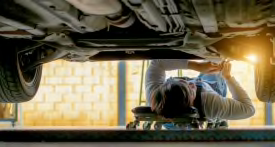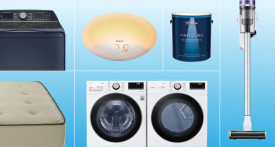The Truth About Certified Pre-Owned Cars
Understanding this alternative to buying a traditional new or used car

Buying a used car can save you money and get you behind the wheel of a more luxurious model than you could afford to buy new. For those looking to lease a new car, buying a used model outright can provide cost savings and eliminate the mileage restrictions of a lease. But some people are afraid to purchase a car with a mysterious past, which is why automakers created the “certified pre-owned” designation.
By definition, a CPO used car is one that has been vetted and deemed to be in better operating condition than its peers.
“CPO vehicles are often cherry-picked, have lower miles, and are cleaner vehicles with a clean history,” says Alex Yurchenko, senior vice president for Black Book, an automotive data and analytics company. “They’re also protected against defects and expensive repairs by an extended manufacturer’s warranty.” CPO cars may also pass a multipoint inspection to check for systems or components that may be in need of repair.
Searching for a used car? Try our used-car marketplace to search by make, mileage, and other filters to help you zero in on models in your area.
Keep a Healthy Skepticism
Dealers tout CPO cars as the better choice because of their extended warranty, near-mint condition, and savings over buying new. But CR’s auto experts say that a regular used car can be a better value.
“Buying a CPO car is basically purchasing a pricey extended warranty for peace of mind against unexpected issues,” says Gabe Shenhar, associate director of CR’s Auto Test Center.
There are also various degrees of certification. A used car may be advertised as certified but may not have the backing of an official automaker’s certification program. Some dealers "certify" cars themselves or sell third-party certifications. These types of CPO programs bring risks.
For instance, you could be stuck in a paperwork snarl when it comes time to make a warranty claim, especially if you seek work at a different shop or facility.
You need to be aware of the differences in the programs, and you should ask the dealer to provide full, official documentation so that you know what kind of warranty you are buying. Also, not all certifications may be transferrable from one owner to the next. Be aware of that when buying a used car from a private individual.
A Better Plan
Instead of paying a premium for a certified used car, CR’s auto experts say that consumers looking for the best value should save their money and use our list to find a noncertified used car that’s likely to be reliable. They can then put aside the savings to cover any repairs that might crop up.
If a noncertified used vehicle is still covered by its original warranty, the buyer can purchase a factory-backed extended warranty at a negotiated price, but CR’s auto experts say that in most cases this is not a smart investment.
Before buying any used car, always have it inspected by a trusted independent mechanic who can confirm that all the systems and components are in order and detect any damage or hidden repairs. Be forewarned: CR has run across certified pre-owned cars that were not properly inspected or that turned out to have hidden damage.
Other precautions to take: Do an internet search of the full VIN (vehicle identification number) to see whether any revealing information pops up, enter the VIN at safercar.gov to check for open recalls, and purchase a vehicle history report from a provider such as AutoCheck or Carfax. (Though it can be a helpful tool, bear in mind that a clean history report is not a guarantee that the vehicle has never been in an accident.)
This do-it-yourself approach may be all the certification you need.

















